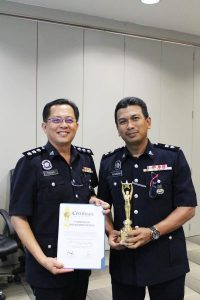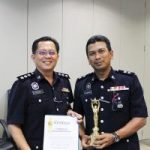
Crime is defined as an action that goes against the law and is therefore legally punishable. Anybody with a sound mind knows that a criminal act is forbidden, yet there are still people who commit it. The reason for this behaviour may lie in understanding what goes on in a criminal’s mind and studying the community around them.
ASP Tuan David Chung, currently serving in the Division of Investigation and Traffic Enforcement at Traffic IPD Iskandar Puteri, did his part by engaging with the community of Bandar Baru Permas Jaya where he was previously the OCS (Officer-In-Charge of Station) of Permas Jaya. Under his leadership in Permas Jaya from 2012 to 2018, the town which had a high number of motor vehicle hijacks, snatch thefts, and house break-ins, successfully saw its crime rates reduce. To achieve this, he surveyed the community to find out the nature of crimes and found three key points that led to a criminal occurrence: 1) Having Intention, 2) Having Support, and 3) Having Opportunity.
1. Having Intention
A person with intentions of committing a crime, according to Tuan Chung, can be influenced to carry out such acts. People with criminal intentions are usually lonely and end up seeking friendship from the wrong company. They also often face problems at home from a young age. Criminal gang members tend to look out for one another and make everyone feel valued. Therefore, Tuan Chung stresses the importance of healthy and loving relationships within families so such individuals can feel useful and loved in their own home instead of looking for these feelings in the wrong places.
2. Having Support
Support here means networks like spies, mobile communication to contact each other, and the transportation used by the criminals. These three aspects are not possible to cut off, said Tuan Chung, but can be blocked or disconnected by identifying them earlier.
3. Having Opportunity
We don’t realise it but sometimes we provide easy opportunities for crimes to occur. Tuan Chung advises the public to make sure we are not their targets by being less flashy with our valuables. One can also increase hurdles for criminals by installing cameras, securing gates, and by being alert of their surroundings. One should know the phone number of their local neighbourhood police post by heart, and should immediately call the police if any suspicious behaviour is detected. Tuan Chung has trained his team to respond and reach a location within fifteen minutes. The success of the police force is determined by the proactivity and contribution of the community; these two are not separate. Tuan Chung introduced Community Policing where the community acts as the CCTVs of the police. Talks were conducted at neighbourhood playgrounds and community halls to educate people on what to look out for. More importantly, Tuan Chung also believes in educating the youth on the downside of gangsterism, bullying, and vandalism by going to schools to conduct talks. Now leading the traffic department, he goes to schools to share more about road safety. Most school students do not have a license and therefore do not know traffic rules; their reasons for not obtaining a license vary. Their understanding of safety and traffic rules is more important to Tuan Chung




